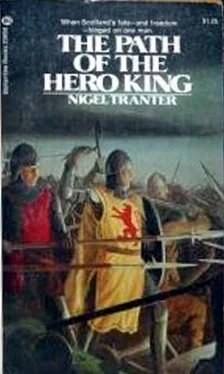Thinly, the noise of distant shouting came from in front.
Bruce waited no longer. Rising, he stepped back, and raised his hand, to wave. Right and left he turned, waving.
All along the lip of that hillside shelf the Islesmen sprang into furious action. Within a few seconds of the signal, scores of boulders, great and small, had been tipped over the edge of the terrace, to begin their headlong bounding descent.
The King turned to Hay, at last, and threw the Highland hunting-horn to him.
Now, Gibbie! he cried.
Sound! Blow you, loud and long!
High and hollow, its winding, hooting belling never to be confused with the brassy blare of trumpet or bugle, the horns message wailed and echoed amongst the thronging hillsides, far and near.
Before it died away, the screams of men and horses were ringing out from directly below.
The first rocks were smashing down upon the English line, hurtling indiscriminately but in such numbers as to be utterly, comprehensively disastrous. There could be no taking action to avoid the bounding, crushing, erratic hail of them. The horsemen were totally without protection on that naked brae face beasts and riders flung like skittles, in utter ruin.
On and on the fusillade of grey granite continued, each stone, even the smallest, a projectile of fierce velocity by the time it had plunged down the hundreds of yards of steep slope. The enemy cavalry was spread two abreast along that narrow track for well over a mile, and within a few brief seconds, practically all its central files, for almost half a mile, were swept clean away in mangled bloody chaos, down in flailing hooves and limbs to the water.
There was no need for all the collected rocks to be launched away, in fact. Indeed, Bruce, himself all but appalled by the scene of blind havoc he had conjured up, was in two minds whether to order the downhill charge planned, to complete the immediate debacle below. It was scarcely necessary, and the Islesmens eager broadswords could be needed elsewhere.
Gibbie! he yelled.
Take a few. Two score. Down there. To finish the task. Then along, to aid Boyd and Edward. You have it?
Aye, Sire. And you?
I take most. Right. Campbell has the heavy end of this. And fewest men. Though not Clifford. Give me the horn …
So, desisting in the rock-rolling, the Highlanders divided into two unequal companies, both surging over the edge, to go bounding downhill, shouting their slogans, broadswords out. The lesser number went straight down, though spread along quite a wide front, to finish off the broken horror of a column which now largely littered the loch-shore; the greater went racing slantwise, right handed, northwards, down towards where the stone fusillade had tailed off, Bruce leaping at their head, thankful indeed for action.
Down there confusion enough reigned already. Utter disaster ahead, and cut off from their main leadership, the long files of horsemen were most obviously in doubt whether to press on to the aid of their fellows, and meet possibly a similar fate, or to turn back and get off this devilish constricting track and exposed hillside.
The sight of Bruces horde of charging cater ans bearing down on them seemed to convince the majority, at least. Not without difficulty and delay, the truncated column turned on itself and began to hurry back whence it had come.
But now the noise of clash ahead became evident to them.
Campbell had not led his seventy-five straight down out of the eastern-most side glen, which would have brought him into the soft marshland, but slightly uphill to the south, over the base of a shoulder of Muldonach. Now, in extended order, they flung themselves down at the vital hinge of the enemy line, where it left the solid ground of the track-head for the quaking water-meadows. His move, of course, would have been entirely evident to the detached English flanking party sent up to stop the mouths of the two glens;
but these were on the wrong side of a rushing mountain torrent, and helpless to do more than hasten down again to the ford in the woodland, half a mile below.
Campbells charge, with all the benefits of impetus and purpose, as
well as surprise, swept another sizeable section of the enemy into
irretrievable disorder. There were still many hundreds __ _ English array disengaged, but they were strung out over a great area and on hopeless ground for cavalry. Pockets of resistance and discipline developed, but by and large panic took its fatal grip.
The sight and sound of Bruces yelling Islesmen clinched the matter as
far as the enemy south of the marsh was concerned. None who could get
away awaited their impact. Some, rather than queue to take the winding
marsh-path, plunged into the loch itself; but most risked the quagmires
of the water meadows
Many got away, of course. But large numbers did not. For those green levels were treachery indeed for horsemen. And hunting the floundering cavalry like baying hounds came the leaping Islesmen, agile and light-footed. Great was the slaughter in that bog.
Bruce left the cater ans to it. Campbells moss troopers on the lighter garrons of the Annandale hills, were chasing what was left of the fleeing column, by the single marsh-track. It seemed obvious that there would be no English stand this side of the river-and possibly not beyond it. The King grabbed a riderless horse, and set off back along the hillside track.
He reached the area of shambles where the stones had done their fell work, to find only dead and dying there. Hay and his men had already completed their task, and hurried on towards the ravine.
Bruce spurred his heavy English charger in their slippery, blood soaked tracks.
He had not gone far when a single horseman rode to meet him.
It was Sir Robert Fleming, a sallow, thin-faced youngish man with great brown eyes almost like a womans.
All is by with, Your Grace, he called out, excitedly.
They are fled. When the Lord Edward came out on them, from the rear, and we turned back on them, from the front. They were caught. In no formation. They fought for a while, as best they could. But…
Clifford, man? the King interrupted.
What of Clifford?
He fought his way through us, Sire. We could not hold them.
There were more of them than there were of us, even so. We in front could not do more. They cut through us, and on southwards.
Fleeing…
You mean Clifford has escaped? A curse on it-I have lost him!
What could we do, Sire? When it came to close combat, they were better armed, armoured and horsed than we. Clifford and his knights. We went down before them. We lost not a few. Boyd is wounded …
Aye. I am sorry, Sir Robert. It is but that I sought him. Wanted Clifford for myself. A… debt of honour. A selfish whim!
At least, the Lord Edward pursues him hotfoot. I think he will not stop until he reaches Cree.
Perhaps. Aye, perhaps, friend. Who knows, it may be as bitter a notion for Clifford to have to live with than if I had worsted him here in Glen Trool. But… that man will seek vengeance. And take it, as he has done before, on innocent folk, I fear. The King shrugged.
Another time, perhaps. He straightened in the saddle.
Go you back, Sir Robert. My compliments to Boyd. You have done well. I hope he is not sore hurt. And tell Gilbert Hay to send his fleetest rider after my brother. With my royal command that he is to turn back forthwith. Not to continue the chase. It is profitless, dangerous. Back with him. And Hay to bring on all able men to the ford at the loch-head. Quickly. We may need every man, yet. You have it?
The two men parted, each to hurry whence he had come.
But back at the ford in the wood, nearly two miles away, Bruce found no battle either. Sir Neil Campbell, mud-covered from a fall from his horse in the bog, revealed that it was all over here too.
Читать дальше












